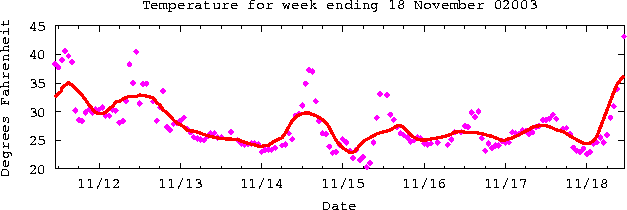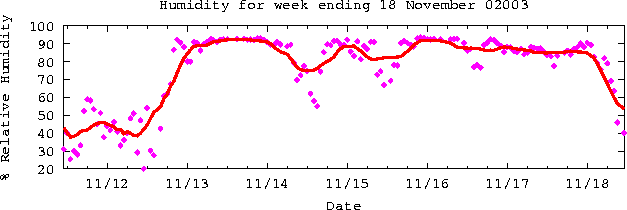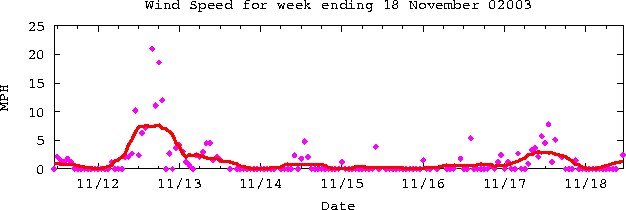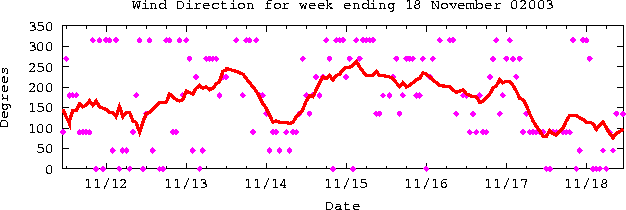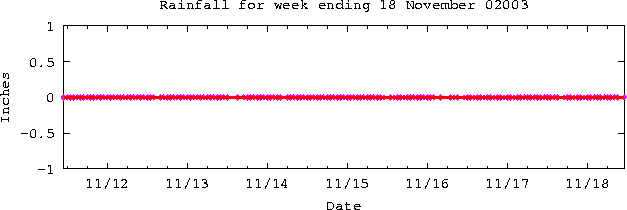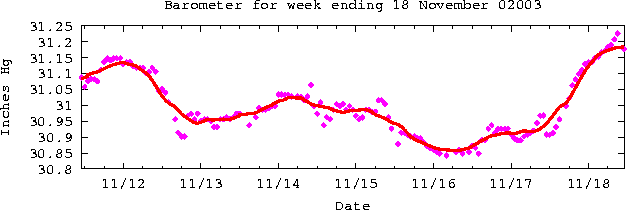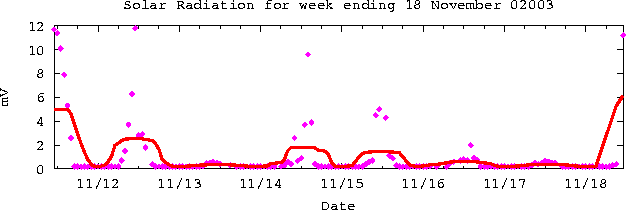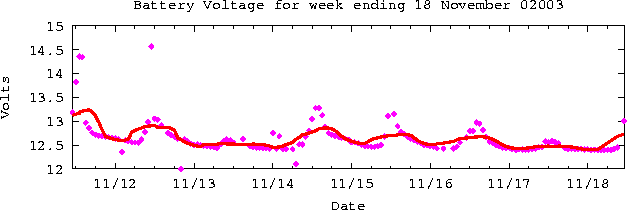
The Long Now Weather Station: Historical Data
|
|
| Temperature is now logged by a Coastal Environmental S1074 sensor (as of June 29th, 02003) Previous to that it was logged with the internal temperature sensor in the ZENO computer which had a configuration bug that did not let us sense temperatures below freezing.. (Pink dots are data points and the red line is the average.) |
|
|
| Humidity is gathered once per hour by a TH-2013V sensor by Texas Electronics.(Pink dots are data points and the red line is the average.) |
|
|
| Wind Speed is gathered once per hour by a TV-110-L3 sensor by Texas Electronics.(Pink dots are data points and the red line is the average.) |
|
|
| Wind Direction is gathered once per hour by a TD-106-5D sensor by Texas Electronics. Zero degrees is East, 90 degrees is North, 180 degrees is West and 270 degrees is South. (Pink dots are data points and the red line is the average.) |
|
|
|||||
|
|||||
| Precipitation is gathered once per hour by a TS-525I sensor by Texas Electronics. Since this is not a heated rain guage it will not operate in winter. Note: Due to sensor connectivity problems in April of 02003 we cannot show rainfall between April and July 1st of that year. We are now using a series of widely dispersed rain gauges throughout the mountain to record rain offline as well as with this sensor. (Pink dots are data points and the red line is the average.) |
|
Atmospheric Pressure (Barometric): Last Recorded 7 Day Period |
|
|
| Barometric pressure is gathered once per hour by a TB-212M sensor by Texas Electronics. We had to get this sensor specially compensated for our high elevation (~9000ft.) (Pink dots are data points and the red line is the average.) |
|
|
| Solar intensity is gathered once per hour by a TS-100 sensor by Texas Electronics.(Pink dots are data points and the red line is the average.) |
|
|
| Battery Voltage is gathered once per hour by the internal voltage sensor built into our Zeno weather station computer.(Pink dots are data points and the red line is the average.) |
Other local weather stations roughly in order of proximity
- Great Basin National Park
- Baker Flat
- Baker Creek NV
- Mather, NV
- CattleCamp, NV
- Ely, NV Airport
- Elko, NV
- Spring Gulch, NV
- Pioche, NV
- Wendover,
UT
- Black Cedar, UT
- Signal Peak, UT
- Eureka, NV
- Weather Underground for NV
This project was implemented with a special use permit granted by the US Forest Service: Ely Ranger District.The project was conceived by Paul Saffo and implemented by Alexander Rose and Kurt Bollacker. We would like to thank the following people and agencies for their support and help with this project.
- The Mitchell Kapor Foundation
- US Forest Service: Ely Ranger District
- Great Basin National Park
- White Pine County
- Dave Tilford
- Robert Johnson
- Ron Miller
- Ryan McCown
- Tad Rallow
* The Long Now Foundation uses five digit dates, the extra zero is to solve the deca-millennium bug which will come into effect in about 8,000 years.
